#she's not a number she's not a necessary sacrifice humans are collateral this HAS to stop
Text
-
#this is the point where i don't know how much longer i can cope tbh#a mother rocking her dead babies and kissing them and speaking to them#and they're swaddled in body bags#it's too much it's too much#how can you not see that she is you in EVERY way that matters#and her children are your children in every way that matters too#she's not a number she's not a necessary sacrifice humans are collateral this HAS to stop#why are our leaders such demons#probably because in this system the only way to climb to the top is by being a demon#they're used to sacrificing other people for their personal gain#the whole system is evil#she is like you in every way. look at her. feel what she's feeling and DESPAIR and then stand up for her SOMEHOW#how can anyone NOT see every child you've ever known in these children#genocide#germany is complicit
0 notes
Text
Okay, so here’s a Salem theory I’ve recently come up with that ties into an aspect of her character that I feel has been largely under-explored:
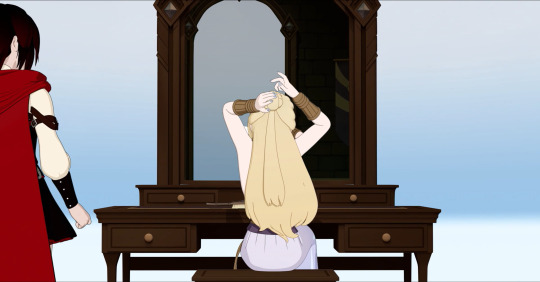
The fact that in many respects, Salem is all too similar to RUBY.
As I’ve stated in the past in other posts, there are some very interesting similarities that can be drawn between Ruby and Salem. To the point where I think we can consider Salem to be Ruby’s true ‘evil-counterpart’ in the story. Particularly ever since the ‘Girl in the Tower’ episode of Fairy Tales of Remnant.
The Girl in the Tower showed that Salem ALSO had a great love for stories as a child, just like Ruby. And across the show, we have shown Ruby develop a number of traits and abilities much like what we have seen from Salem.
Both have built a select group of close and loyal allies, and in recent volumes, Ruby has displayed a growing talent in manipulating her enemies to gain advantage over them just like Salem. And as of the Volume 9 epilogue and Beyond, we are seeing Ruby rallying the entire world against Salem, just like Salem once did against the gods.
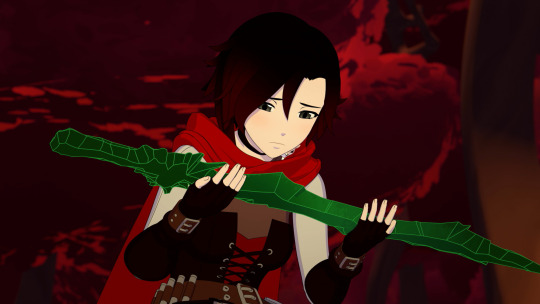

Heck, Ruby likely has her own equivalent to Ozma in PENNY, as recent volumes have emphasized more and more. A great warrior in green touched by magic who is tragically taken from Ruby, only to be brought back and then taken from her again.
There are even notable similarities in their physical abilities: Ruby’s Silver Eyes seem to be a power drawn from the God of Light, just like Salem’s immortality. And as I’ve theorized in other posts, recent revelations about Ruby’s semblance might mean that Ruby could potentially be just as unkillable as Salem.
It all feels like something that could very naturally build to a classic “We are not so different, you and I…” twist and exchange between Ruby and Salem.
Ultimately, I think a/the big twist and reveal about Salem that we’re eventually going to get is that she is a fallen hero. And more specifically, that she represents a fallen RUBY.
Let’s consider for a moment that we have every reason to view Jinn as an unreliable narrator when it comes to her vision in Volume 6.
And when we start looking at Jinn’s vision with the knowledge that it is almost certainly both HEAVILY skewed in favor of the God of Light and meant to paint Salem in as UNFAVORABLE light as possible, then I think we can get a much better picture of Salem in the old world.

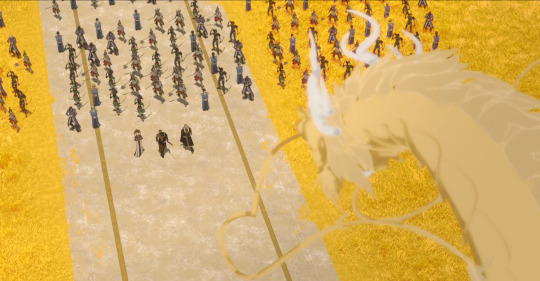
Again, I think that the biggest and yet most natural and logical narrative twist we could see here is a big reveal that Salem was in fact absolutely a HERO, and more specifically was essentially the RUBY of her time: She united the whole world, just like Ruby is doing. All to lead humanity against a terrible threat, just like Ruby is doing.
And Salem ultimately FAILED.
Salem was able to unite humanity and lead them against the gods, only for it to all go terribly wrong. When the gods (likely Light, given both the unreliable nature of Jinn’s narration and what we learned from the Blacksmith) wiped humanity out and left Salem alive as a ‘punishment’ for her ‘insolence’ for rising up against them.
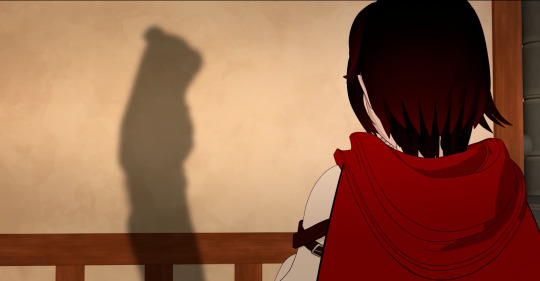
Thus does Salem represent a dark and tragic look at a Ruby who ultimately failed. And was so completely and utterly BROKEN as a result that she has eventually become twisted into a terrible villain.
And the really cool thing is; if we start looking at Salem as essentially representing a broken, fallen Ruby who has become a villain, I think this could give us an avenue to guessing just what Salem’s REAL goals truly are.
Because what might a fallen, twisted, villainous Ruby who failed to save humanity actually WANT?
Well, what if Salem actually wants to bring Old Humanity BACK?
As in, undo the destruction wrought by the gods and REMAKE her old world. And more specifically, undo her great FAILURE.
Unfortunately, Salem also views the PRESENT humanity/faunus as nothing but regrettable collateral damage or possibly even necessary sacrifices to her plan. Or just as ‘pretenders’ who are in her way.
Thus does Salem possess what seems to be a noble goal to her, yet has led her to becoming all too similar to the gods she once stood against.
And I think we can already find a couple potential hints to this. Like how in Jinn’s vision, we see that Salem at first simply wanted to rule over the ‘present’ age of humanity, and how she was overjoyed at learning that her and Oz’s children inherited their magic.
But then Oz told her about the relics, and Salem started getting IDEAS.
What if the REAL reason that Salem is after the relics is because she sees them as a way to bring back the humanity that was lost? Her humanity.
This could even give us an answer as to what Salem intends to do about the gods:
After all, Salem wouldn’t just be resurrecting just any humanity, she’d be bringing back the humanity that she united behind her. All the loyal friends, allies and followers who followed her into battle against the gods.

What if Salem intends to finish what they started?
And as to how Salem intends to prevent a repeat of what happened last time?
Well perhaps that’s what all of Salem’s hybrid experiments are for. I mean, a combination of the powers of Light in the Silver Eyes and Dark in the Grimm? What if Salem trying to figure out how to use the Brothers’ powers AGAINST them?
All in all, I feel like Salem turning out to represent a ‘Fallen Ruby’ presents a very natural way to tie together all the parallels we’ve already seen between Ruby and Salem, while also just being a great twist.
Like it’s one thing for our big villain to have some general similarities to our main heroine. It’s a whole other deal for it to turn out that at one time, this big villain was in fact JUST LIKE our main heroine. Driven by all-too-similar heroic who sought to save the world from some seemingly all-powerful threat. And showing just how our heroine could become the very thing she is fighting so hard against.
Such a twist and reveal would hit seriously hard for Ruby and co, and really solidify Salem as Ruby’s final narrative foil and true evil-counterpart. Summer showed how Ruby’s self-destructive hero-complex could ultimately break her.
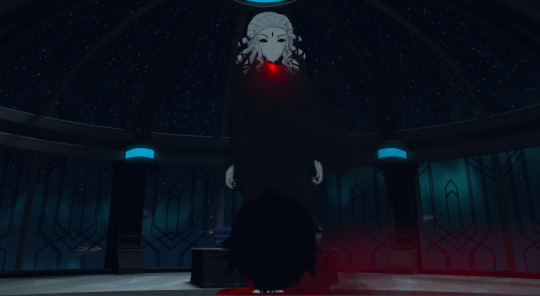
Salem shows how Ruby could become all too similar to the very thing she was fighting against.
#rwby#rwby analysis#rwby theory#rwby character analysis#character parallels#Ruby Rose#Salem#salem is ruby's evil-counterpart
160 notes
·
View notes
Note
So since Tyrian's arrest screen didn't list everything he was wanted for, what else do you think he did? My brother thinks arson, I think more along the lines of torture.
It’d probably be easier to ask, “What crimes didn’t he commit?”
I think you’re both right. Arson and torture seem like equally valid possibilities, but they’d have to be the result of context and circumstance. On one hand, Tyrian always struck me as someone that’s adaptive, flexible, and capable of improvisation, which is why I doubt he’d be averse to either. On the other hand, Tyrian appears to have a modus operandi—speed and stealth. Like most Faunus, seeing in the dark (presumably with tapeta lucida, the eyeshine a lot of nocturnal and crepuscular animals have) affords him an advantage many of his victims lack. That, coupled with his stinger, sets him up by default for a very specific tactic: hit-and-run assassinations. Catch your target off-guard, deliver the killing blow, then melt back into the shadows before anyone’s the wiser. Fire lacks discretion, and torture involves prolonged interaction with the victim (which increases the odds of him getting caught, as time/duration would be proportionate to the risk of being discovered).
If a situation called for it (like setting a car on fire in order to distract pursuers), or he was contracted to complete a specific job (like torturing someone for information), then I could definitely see him committing arson and torture. But if he’s recreationally killing, then I think it’s more likely that he’d indulge in his preferred repertoire, envenomation and stabbing.
The nice thing about his criminal record being truncated (with a “see attachment for more details” appended to the file) with multiple redacted sections is that it leaves a lot of room for speculation. Bear in mind that much of this is either conjectural with little supporting evidence, or my personal headcanons.
One of the things that I found interesting about Tyrian’s character was his reverence of Salem. “Goddess” isn’t just an affectionate title or a term of endearment—he literally apotheosizes her. Compare that to how his teammates interact with her. While they treat her with respect, none of them use the same venerating language as Tyrian (“Your Grace,” “my lady,” “our divine savior,” “our goddess”). This tells us that his worship of her isn’t the norm amongst her followers, which also means that he has a reason for doing it.
Personally, I’ve never been a fan of labelling people who commit heinous crimes as crazy or insane—not only because it implicates nonviolent mentally ill and neurodivergent people, and scapegoats them for the actions of others—but because in this instance, it robs Tyrian of the complexity that comes with rationalizing one’s choices. Tyrian’s decision to deify Salem shouldn’t stem from some sort of psychopathology, but rather a logical, personal, or historical precedent.
Let’s reverse-engineer this thought process:
Tyrian worships Salem.
Salem (in Tyrian’s eyes) is the extreme embodiment, manifestation, or expression of cathartic violence.
Tyrian worships this form of violence.
And what else in RWBY’s universe embodies those traits?
The Creatures of Grimm.
So, with that in mind, let’s talk about all the illegal things Tyrian’s done over the course of his life, and more specifically, why.
Archotherolatry: This is a term I coined for my RWBY worldbuilding blog. If you break down the etymology, archotherian (Greek - ruling beast, the scientific term for Grimm) + -latry (Late Latin - worship of), it translates to “the worship of Grimm.” The practice was outlawed by the King of Vale (King Ozark) after the Great War. While the decision was rooted in common sense—like, you really don’t want people to see the Grimm as gods for fairly obvious reasons—Ozark had ulterior motives for outlawing it. You see, Ozark was one of Ozma’s incarnations, and the immediate predecessor of Ozpin. While archotherolatry had been falling out of favor over the last few centuries, it was still a religion with a presence in certain corners of Remnant. Salem used to recruit these cultists directly into her ranks. By making the practice illegal, Ozma was hoping to cut off a potential source of followers.
Prior to meeting Salem, Tyrian was one of the surviving few practitioners of the faith. Not only that, but he had a particular mania about it. Grimm worship in Remnant changed depending on where in the world you went, but one of the recurring practices involved human sacrifice. Now, while Tyrian didn’t subscribe to any specific holy doctrine and wasn’t a member of any secret groups, he did adhere to certain rites and ceremonies. He savored the taking of lives, but even more than that, he enjoyed offering up his victims to the Grimm. During the months that Pickerel spent hunting him down, his trails would often lead him to secluded areas outside cities or towns. There he’d often find a large ornately-detailed circle on the ground painted with blood, with the tattered corpse of the victim lying in the center. The surrounding trees and rocks would sport eye-like patterns drawn in blood, similar to the patterns seen on the bony white protrusions on a Grimm’s body.
When selecting potential victims, Tyrian didn’t discriminate. Gender, age, nationality, race, economic background—they all bleed red, so it didn’t matter. Not technically, anyway. That wasn’t to say he didn’t enjoy abducting business owners that were prejudiced against Faunus, or that he didn’t find ironic humor in sacrificing Huntsmen to the Grimm. He just wasn’t particularly choosy about who he sacrificed.
In a similar vein, I think this is how Salem first learned about Tyrian’s existence. Whenever her scouts or sentries returned to Evernight and reported in, they’d inform her about a man that would drag people into the woods and invite the Grimm to feast upon them. This possibility excited Salem for several reasons: not only was he predisposed to loyalty to her, but the fact that he’d clearly been doing these sacrifices for some time meant he was talented. It took a lot of skill to kill so many people without being caught by the authorities. She needed an assassin, and he would do perfectly.
When Tyrian wasn’t feeding people to the Grimm, he probably murdered for sport. He thrilled in the hunt, in the dizzying slick of blood beneath his fingers, the intoxicating coppery smell, the beautiful song of his victims as they cried, begged, and screamed. Acts of violence honor the Grimm, but in addition to that, he simply relished in the joy of killing. And he was good at it.
Of course, sacrificial manslaughter doesn’t pay the bills, so Tyrian had a day job. Well, I say “day job,” but it was more along the lines of contract killer/thief/kidnapper/smuggler. Tyrian operated largely out of Mistral’s criminal underworld, particularly in the capital (though depending on the work he was doing, he’d travel to Wind Path or Kuchinashi). Potential clients sought him out and hired him for any number of jobs: collect the debt that this person owes me and kill them if they refuse to pay; abduct the member of this rival syndicate and bring them to these coordinates; assassinate someone for me, and bring back proof that they’re dead; transport this contraband (weapons, drugs, Dust) and ensure the shipment arrives safely; kill these people and destroy the evidence; capture this person and extract information from them by whatever means necessary; follow this person without being detected, and collect information about their routine. Although Tyrian preferred jobs that involved bloodshed, he’d still accept contracts for more mundane work (even if he found it somewhat boring). Tyrian didn’t have a ton of dealbreakers in terms of jobs, though he refused to do anything that involved sexual assault. (Even serial killers have standards.)
Destruction of public and private property was likely an unintended or indirect consequence of his work. As much as Tyrian enjoyed wanton carnage, he prided himself on being stealthy and thus had to exercise some level of restraint, so as to not leave behind damning evidence in the form of collateral damage. Breaking a window or kicking in a door is a liability. Accidentally setting off a Dust explosion is a good way for the authorities to track you. That being said, there were a few memorable occasions where Tyrian absolutely wrecked shit up. Perhaps the most noteworthy of these was the day that he was finally captured by Atlesian and Mistrali law enforcement. On the day of his arrest, Tyrian caused nearly 50,000 lien’s worth of property damage, including the destruction of three Paladins.
Tyrian’s name, while spoken among the criminal element, was unknown to the public. Even so, he garnered a reputation as Anima’s most infamous serial killer. People often referred to him by his title: The Ghost in the Mist. (Years later, a documentary by the same name was released. It was an hour-long production that detailed his activity in Mistral, all of his victims, an analysis of his signature, and other relevant or interesting trivia. It even featured an interview with Pickerel, prior to his death. Tyrian absolutely loves this documentary and has re-watched it several times.)
I’m sure there’s more that he’s done that I can’t think of presently, but hopefully this gives you a general idea of all the criminal activity I think he’s committed.
#rwby#rwby thought dump#tyrian callows#salem#f. pickerel#rwby worldbuilding#mistral black market#asks#the word count for this is 1500 words#consider this an act of penance on my part for not responding sooner#grimm#grimm worship#archotherolatry#i hope you liked some of these!#kittencowfrog#my posts#i speak#ozpin#ozma#king of vale
33 notes
·
View notes
Note
Isn't Rhaegar absolved from his actions due to the fact that the prophecy is true and his son with Lyanna is the savior of the human race? Isn't Jaehaerys II absolved from his since the prophecy was true and TPTWP, in fact, is born of Aerys and Rhaella's line? I know we can mull over how Rhaegar could have done things differently to get his third child, but it seems that it was destiny. With Jaehaerys II, there wasn't even another option but to force the marriage to fulfill the prophecy.
Neither is absolved, no. Because the ends do not justify the means, and destiny is only what we make of it.
So many characters in this series act on the rationale that the greater good merits any number of sacrifices made in its name, which is also often used to justify and minimize blatant atrocities. Varys plays with people’s lives and maims children on the thought that King Aegon will right all the wrongs in Westeros. Mel argues that burning children alive is a necessary price for the survival of everyone else. Rhaegar treats the thousands of lives lost over the course of the rebellion as an acceptable collateral damage for a prophetic enterprise. Stannis is on the path to fall to that same viewpoint of a necessary sacrifice (”we do not choose our destinies” You do, Stannis. You do. You’re the only one who can choose). Robert’s council tries to frame Dany’s assassination attempt in the context of how ending two lives would spare thousands. Tywin tries to spin the Red Wedding as something that spares countless lives that would have fallen if the war continued. Mirri Maz Duur kills an unborn child on a crime he has not committed. Bloodraven may have honed Euron’s magical abilities on the notion that it would be worth it in the end, and he has a history of working on the basis of “the ends justify the means” during his tenure as Hand (e.g, killing Aenys Blackfyre in a breach of safe conduct, letting the Greyjoys pillage and reave as they please because he was too focused on the Blackfyres, etc). Though there is an obvious variance in the overall morality and sincerity between these character, all of them give the same rationale of a necessary evil done in the name of a greater good. If you have to sacrifice a few to save everyone else, if you have to sacrifice one person to save everyone else, it’s a no brainer, right? What is one life opposite everyone else?
The answer is “everything”
Human lives are worth so much more than being means to an end. Putting people on the chopping block for “the greater good” dehumanizes them by reducing them to sacrificial lambs in the name of a higher purpose. But ASOIAF has always advocated for the recognition of the value of life and respect for the sanctity of human life. Though the methods may vary, the text remains loud and clear in its refusal of dehumanizing ideologies, whether the source is human characters like Tywin Lannister, Robert Baratheon or Randyll Tarly, or supernatural creatures like the Others who are the literal embodiment of dehumanization. ASOIAF is about the fight for our common humanity, for recognizing that humanity regardless of things like class or race or which side of a magical wall you were born on. But you can not fight for our common humanity by devaluing people’s lives. You can not use the argument of “doing it for humanity” to disregard the humanity of those being sacrificed. That cold ruthless pragmatism is not the point of this series; the fight against it is. That’s been the point from the first prologue when Wymar Royce stared the abyss in the face and charged at it.
That’s why the support of the narrative lies with characters like Ned Stark and Davos Seaworth who refuse to give into the idea that the cruelty and dehumanization is necessary for the greater good. Through them, GRRM delivers the point that every single human life matters. That saving one person can mean everything. That it’s not naive to think that one life is worth everything. Protecting the one is not inherently inferior to protecting the many. The greater good can just as well lie in saving one person. Which it did in the case of Ned and Jon.
I think it’s pretty significant that Ned had no idea about the prophecy or what role Jon would play when he protected Jon, while Rhaegar who did know made everything exponentially harder. There’s a rather underappreciated irony in the fact that Rhaegar (and Jaehaerys) had little to do with fulfilling the prophecy; in fact, they jeopardized it. They may have orchestrated the circumstances under which Jon and Dany could be conceived, but a closer look shows that Jon and Dany were born mostly in spite of them and their actions. I mean, Jaehaerys married Rhaella off so young it impacted her health and her ability to bear living children. She almost died at Summerhall along with Rhaegar in an ill-fated attempt to hatch dragons, and while that’s mostly on Aegon V, I expect that Jaehaerys was fully on board as well considering the measures he took for the prophecy. Rhaegar impregnated a teenager and left her to give birth in less than ideal circumstances, and spurred a civil war thing that weakened the realm and put his entire family at risk and got a few of them killed. I can only describe their efforts as counterproductive.
But I find it extremely fitting that they ended up doing little and less for the War for the Dawn, because Rhaegar and Jaehaerys embraced the metaphorical cold in their quest to fight it. Jaehaerys reduced Rhaella to an incubator for a savior as if her humanity and her worth are narrowed down to her womb. Rhaegar was willing to see thousands of people die for his vision of what the prophecy required. They allowed themselves to decide people’s worth. Rhaella, Elia and Lyanna mattered only as much as the children they could bear, and those children mattered only as much as their prophetic roles. Rickard, Brandon, their entourage and the rest of the casualties of the rebellion mattered not at all. But that’s not how it works. Rhaegar and Jaehaerys don’t get to decide people’s worth. They don’t get to decide which lives matter more. They do not get to devalue other people’s lives because these lives are not theirs to decide what to do with. Individual lives matter, not because of a prophetic destiny but because of their humanity.
That’s why I don’t see the prophecy as Rhaegar and Jaehaerys’ absolution, but rather their hubris.I get the sense that they acted on the assumption that the prophecy would make everything alright in the end, especially Rhaegar, and so ended up missing the entire point. They got so entangled in their interpretations of the prophecy that they did everything wrong. Got a lot wrong too since Rhaegar wasn’t even trying to get the Prince that Was Promised from Lyanna; I doubt her was even aiming for a boy. Hatching dragons in Summerhall ended on a tragedy. And of course, no one ever accounted for Tyrion. But the prophecy, true as it may be, doesn’t make things go a certain way; people do.
Which brings me to what you say about how it was destiny that Rhaegar acted like he did instead of other alternatives available to him. This argument fundamentally misunderstands a rather significant theme of this series - that it’s our choices that define who we are. Through the political and magical plots alike, individual choice is held up as immensely important to the point where many characters’ existential victory lies in that choice, the clearest case of all is how the three heads of the dragon have to contend with some version of this dilemma.
It all goes back and back, Tyrion thought, to our mothers and fathers and theirs before them. We are puppets dancing on the strings of those who came before us, and one day our own children will take up our strings and dance on in our steads.
Does Dany have “the taint” of madness? Is Jon’s decision to fight his or is it an inevitability orchestrated by prophecy and Rhaegar Targrayen? Can Tyrion break free of the toxic legacy left behind by Tywin? Do they get to define who they are on their own terms or are they beholden to their lineage and their ancestor’s legacy? That’s for them to decide.
“Yet soon or late in every man’s life comes a day when it is not easy, a day when he must choose.”
Maester Aemon lays down the bare bones of this recurring theme in Jon’s arc. Across multiple books, Jon faces the choice of keeping to his watch or leaving several times which only frames the significance of how his destiny as one of the saviors of Westeros lies in him making that choice. Jon’s “chosen one” status has always been linked to him taking control of his future and deciding for himself. It’s him choosing to stay in Castle Black despite his appalled discovery of the reality of the Watch and to take his vows despite his frustration with the appointment to the stewards. It’s him going with Qhorin Halfhand of his own accord. It’s him picking the Wall over deserting for Robb or Ygritte. It’s him making a conscious decision to be the leader of the fight at the Wall over Stannis’ offer of Winterfell. It’s him taking responsibility of the free folk and recognizing that the commonality of being human is what matters. Jon is on the forefront of the text’s central conflict by virtue of his choices.
Dany is also fighting for our common humanity over in Slaver’s Bay. Her arc is basically a hard fought battle for autonomy, whether hers or the slaves’. Dany fights for freedom, for people’s right to choose, for them to be recognized as people not things to be gifted and sold. “Have you asked them?”, she challenges when Xaro Xohan Daxos argues that slaves have no use for freedom because they were made to be used. But Xaro Xohan Daxos doesn’t get to decide others’ fates, neither do the slavers of Astapor, Yunkai and Meereen. They don’t get to deprive them of their right to choose. People’s lives do not belong to them to decide what to do with. They don’t get to strip them of their free will or dehumanize them by treating them as things to be used to their satisfaction.
Because that’s what the Others are doing. They are supernatural slavers coming with their ice cold chains and stealing every single choice from humanity, right to the choice of dying. You can’t even die. They will resurrect you and force you to be their undead puppet.Mankind can’t even choose death because they will rip death from your grasp and drag your corpse up to join their army. The real threat in this text is a supernatural embodiment of dehumanization and taking away people’s choice. The War for the Dawn is nothing if not a fight for freedom, for the right to choose and to be human.
So the idea of “destiny” controlling how things go? It goes against the very heart of the series. Destiny is nothing but a series of choices deliberately made by individuals to shape the future. There is no fixed inescapable narrative that they can’t deviate from, or some all powerful cosmic power dictating how they should act. Even in the presence of magical visions, it remains the characters’ choices that decide their future. They get the prophecies but what they do with it is on them because the prophecies do not decide who they are. For all the magical elements and prophetic visions in this narrative, it remains that one of the things that the story emphasizes again and again is that our choices matter. They have meaning and they have consequences. Nothing is inevitable unless we make it so.
And that needs to hold true for the story to have any kind of meaning. Acting as if there is some kind of predetermined destiny that compels people to act in a particular way means that literally no one is responsible for their actions. People were just always meant to do what they did. Everyone is bound with chains of magic, lineage and a mystical force that has free reign to manipulate them. Free will is only an illusion fed to pawns that have no control. And if that’s the case, you can no longer hold anyone accountable. How can you call a person good or evil if no one has the capacity to choose their path? How can you hold anyone responsible either for their heroics or their atrocities? And if there is no good and evil, if honor and corruption get tarred by the same brush, if you have no basis to distinguish between the true knights and the false ones, then the only choice is truly “you win or you die”. Which is bullshit. These are false binaries and are far, far from being the measure of triumph.
ASOIAF has never been a story about the futility of ideals but rather about the fight to hold onto those ideals. About how“the battle between good and evil is fought largely within the individual human heart, by the decisions that we make”. It all comes down to a choice and to the accountability for that choice. This series is rife with people trying to sidestep responsibility for their decisions, from Tywin maintaining plausible deniability to Robert willfully closing his eyes to corruption and transferring blame onto the next convenient target to Roose cultivating “a peaceful land, a quiet people” to Littlefinger keeping “clean hands” to Barristan Selmy and Arys Oakheart hiding behind their vows to justify their inaction in the face of tyranny. But they don’t get to outrun their responsibility for their own decisions. No one gets off scot-free, not because of vows of obedience, not because of corrupt systems, and not because of some notion of an inescapable destiny. The narrative won’t let them.
You must make that choice yourself, and live with it all the rest of your days.
#asoiaf#asoiaf meta#valyrianscrolls#asoiaf themes#r plus l equals j#the war for the dawn#rhaegar targaryen#jaehaerys ii targaryen#jon snow#daenerys targaryen#the prince that was promised prophecy#Anon asks#ask box
386 notes
·
View notes
Text
Was really Takasugi a more dangerous terrorist than Katsura?
I was wondering:
In chapter 29 (ep. 17) we learn from Katsura that Takasugi is hated by the Bakufu more than Katsura is.

And in the same chapter/episode Hijikata says he is more dangerous than Katsura and the rest of the Jouishishi.

And we found that he has this reputation because he killed 10 Bakufu’s officials in a restaurant.

Knowing Shinsuke, it was a reckless act, a bloodbath. Anyway, in that occasion he killed ‘only’ ten people and all of them were part of the Shogunate. Surely there were civilians there (it was a restaurant, so other costumers and the staff), but they were not killed.
However, Takasugi went straight to the core: he wanted to destroy the Bakufu? He killed Bakufu’s officials. Simple and straightforward. Sure, he slaughtered them, but they were not civilians, There were not collateral victims. Also the other terroristic acts he did were focused on Bakufu’s arms and legs (Shinsengumi, Shinobi...) -- or personal matters, but this is a whole different part of the story.
And yes, there was the Benizakura affair. I'd say that if he wanted to physically raze and set ablaze Edo, he could. Or at least bomb the city here and there. He had the military power to do so. We know he wanted by Tetsuko, but we don’t know how much her knowledge on the matter was deep, and I’m inclined to believe she interpreted, thus she’s not a reliable narrator of Takasugi’s plans with Benizakura. Indeed, Shinsuke told Murata he wanted to show the era of samurai and katana was not ended and, according to the Shinsengumi, he wanted to stage a coup d’etat.
On the other hand, Katsura was feared for the bomb attacks at Amanto Embassies.
Bombs are much more risky, moreover it is implied he used to bomb even during daytime. It was much more likely civilians were involved (human staff, passers-by...).
And before he bumped again into Gintoki and turning moderate, he wanted to bomb the Terminal. Yes, it was a symbol of the Bakufu, but there how many innocent, human, civil people would have died? Many, probably.
We know only a small part of the terroristic deeds both of Shinsuke and Katsura: we have do deal with a 10-year-gap, after all.
So I honestly think it’s important that Hijikata, thus someone who worked for the Bakufu, called Takasugi that.
Because on Bakufu's view, it was Takasugi, who probably had killed an higher number of Shogunate officiers than Katsura, the most dangerous and the one to be hatred.
While Katsura was probably more a danger for... Like, everyone. Not that he wanted to kill civilians (he surely tried to avoid it), still he used to consider their casualties a necessary sacrifice.
Sure, Shinsuke too didn’t mind to kill civilians, but his style allowed him to kill exactly who he wanted to kill, while Katsura’s acts’ results were unknown until they were done.
35 notes
·
View notes
Text
4x6 The Thrushes
“If you love me...if you ever loved me, just give her to me. Please.”

A dude named René Le Bron has made a business out of loaning money to super rich big wigs who have their assets frozen by the government. For a hefty fee, plus interest, and the assets, once they’re unfrozen.
Kirk has had his assets frozen. So Red goes after the man who is loaning Kirk money. A team takes Le Bron and all the 600 million he was about to give to some of his clients. And a plane.
Red takes his case to the task force. He and Liz have a suspicion that there is a tap in the post office, so they stage a little snit for Kirk’s benefit.

Red: When the sanctions are lifted, Le Bron makes a hefty profit by pocketing the frozen assets he insisted his borrowers put up as collateral...Truth be told, I’m disappointed I didn’t think of it.
Liz: Why bother when you can have us arrest him and then take his place?
Red: Good point.
Red says he’s captured Le Bron and can make him cooperate to give them Kirk if the government guarantees him immunity. It’s something Cooper will have to ask Panabaker for.
Liz joins Cooper in his office and Cooper brings up the snit.
Cooper: I can’t pretend to know the stress you’re under. But from where I sit, he’s doing everything in his power to find Agnes.
Liz: And kill Kirk.

Cooper: You have a problem with that?
Liz: Alexander Kirk is my father. ... I’ll do my job, but I am done cozying up to that snake.
Liz is doing this for the benefit of the tap, but later tells Ressler that she meant it. But the part about only putting up with Reddington until Agnes is back is probably an act, since, in the end, she’s clearly still putting up with Reddington.
Cooper talks to Panabaker over the phone and asks for immunity for Le Bron. The Thrushes guy is listening in. He alerts Odette.
See, this is what I don’t get. Cuz the tap is like, on the phones. The communication. It doesn’t seem to be just, around. To pick up arguments had in offices. It’s not like, a bug on a desk. If it was, Kirk’s tech guy could have called Odette before this. And yet Odette will also know about the ‘seeds of doubt’ sown in Masha.
The snit happened off the phone. But maybe Cooper also mentioned to Panabaker that Liz was feeling grumpy and they just didn’t show us that part? idk. They could be using computer microphones or something, but again, you’d think tech guy would have alerted Odette before the phone call. But whatever.
Odette was already aware that Le Bron had been taken, but this confirms it was Reddington who did it.
“I just received confirmation from the Farm. Reddington was behind the Le Bron abduction. If the FBI manages to turn him, they can track and seize all of your remaining assets. Shall I deal with it? I’ve already acquired the details of his transport.”
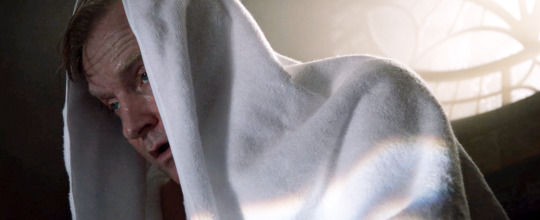
Kirk says yes. So basically she’s going to have Le Bron killed to ensure Kirk’s money remains untouched. I assume the details of the transport were also left lying around in the tech world because Red wants Kirk to know. He wants to flush out the Thrushes.
Odette: It appears the seeds of doubt you sowed in Masha have taken root.
Kirk: It’s time to reach out. Take adequate precautions.
Odette: Adequate precautions? She’s a key consultant for the FBI.

Kirk: Yes. And she’s my daughter.
Odette is protective of Kirk. She doesn’t want him dead or in prison. She thinks his obsession with his FBI consultant of a daughter is making him take unnecessary risks.
Odette gives the order and has someone kill Le Bron as he’s being transported. Cooper calls up Red to tell him. Red gives nothing away on the phone. But now he knows for sure that there’s a tap on their system.
He tells Dembe to send out the ‘invitations.’

See, I would have missed it entirely. I’m not sure if I’ve ever looked at the inside lid of a pizza box.
The team responds and is scanned and ushered into a tap-proof environment.
Samar is peak disinterested.

Red: Welcome to the past. This space is impregnable to every frequency of wireless transmission, including microwaves. Every piece of equipment you see is analog. Our sole concession to the digital revolution is a Ms. Pac-Man machine in the break room.
Cooper: But why?
Red: Because I like Ms. Pac-Man.
Red informs them that Le Bron was a way to confirm there was a mole in the post office.
Red: We set the bait. He took it.
Cooper: A human sacrifice.
Red: I prefer the term “tethered goat.”
Red briefs them on the Thrushes. Cooper wants to shut it down right now, but Red wants to use this to feed Kirk disinformation. But the post office is tied to the NSA, CIA, etc... Leaving the system vulnerable is something Cooper will have to get Panabaker’s approval on.
Cooper puts a lot on the line in the name of getting Kirk. He’s super pissed off when Red just lets him go. I’m sure Cooper took a lot of off-camera reaming from his superiors for that one.
The Hunter interrogates Kaplan. Says whoever shot her might come back.

She claims she shot herself. So the Hunter goes and looks for a gun. Finds none. Then he checks his trail cameras and finds a picture of the gang.
Red has Chester install cameras around the warehouse nursery.
Liz is snippy about it. She’s upset at Red for not telling her her father’s been out there alive all this time.
Red: Any word from Kirk?
Liz: You mean my father?
Red: Honestly, Elizabeth, it astounds me that you could be hornswoggled by something as simple to fabricate as a DNA profile.

Yes, but let’s never give her the context of that dna report that would clear it up for her. That would just be crazy.
The dna report plus the memories at the Summer Palace has her convinced.
Liz gets a call from a shoe repair shop claiming to have found her lost phone. They go there and she picks up a burner that has one number saved in it. She calls it and Odette hands it to Kirk.
Kirk: Masha.
Liz: Tell me about Agnes.
Kirk: She’s healthy. She’s happy. Can’t wait to see her mother.

Liz: You could make that happen.
Kirk: I want to. But as long as you refuse to shield her from Reddington, I can’t.
Liz: I got your SVR file. Your DNA profile was in it. I know you’re my father.
Kirk seems confused as to why the dna report would be in the SVR file. Him being ignorant of his wife’s activities.

This appears to be the first Red is hearing about where she got the profile too.


lol
So maybe I was too hard on him before? Maybe he thought Kirk fabricated one? idk. In any case he knows where it came from now. So he could tell her now. Remove that ‘Kirk is my father’ conflict of interest. Ya know, or not. Whatever.
Kirk: Then you know Reddington lied to you from the beginning.
Liz: Yes.
Kirk: There’s no reason why we shouldn’t be together.
Kirk suggests that they meet. He’ll work out some way to meet her without Reddington knowing and will be in contact later.
She says, ‘goodbye, Father’ in Russian. He responds with a Russian ‘goodbye.’

He’s all happy now.
Red: You were very convincing.
Liz: That’s because I meant every word.
Odette: I don’t trust her.

Odette is right. lol
Samar talks to someone who investigated one of the Thrushes’ other hacks. While looking at the pictures of the scientists that were killed, Samar recognizes Aram’s girlfriend.
So in the midst of an arc about a man deceived by his wife, a wife who also targeted a Naval Intelligence officer, we have Aram targeted by Janet. Aka, ‘Elise.’
Samar tells Ressler and Cooper. She wants to tell Aram, but Ressler thinks Aram will give away that he knows. It doesn’t matter anyway because Aram figured it out on his own.

Aram: Someone had to dupe an FBI employee with level 4 clearance...
Samar: And it was you.
Aram is going to use his dinner date to run a tap on Elise’s computer the way she did on his.
Aram: No, no. What, am I gonna shoot my girlfriend?
Samar: She’s not your girlfriend. She’s a hostile operative, and you are a trained federal agent.

"If anything goes wrong, the safety word is “banana.”...Use it, and in come the Marines. But they better get there before I do because I will mess that bitch up.”

Aram: Really?
Samar: Oh, yeah. Really.
Red and Cooper wait back at the analog safe house. Red confides a bit in Cooper.
“When I turned myself in, I never imagined things could’ve turned out this… badly....I knew it’d be hard, but I… never expected that it would get… harder with every day....I knew it would complicate things. I’d be forced to take security measures… Things she’d hate.”
I think the complication is Liz being exposed on the news as Masha. But Red says Kirk was never on the blacklist. He wouldn’t have bothered Kirk if he hadn’t come for Liz. Cooper is obviously in the dark as to why. Cooper buys that Kirk is Liz’s father.
“Now all I see is the resentment in her eyes. I’m suffocating her, Harold.”

At the end of the season it will be Cooper who takes the initiative to see whether or not Red is Liz’s father.
Meanwhile, Liz is deciding whether to call Kirk and set him up. She doesn’t want to lose access to him. She doesn’t want him thrown in a hole where she’ll never be able to get the information she wants out of him.

But Kirk won’t hand over Agnes unless Liz agrees to shield her from Reddington. And as pissed off as Liz is at Red about the whole thing, whether or not she allows Reddington to be in her life or Agnes’ life is her decision, not Kirk’s. As she’ll tell him later.
So she sets up her father to be arrested. She’s not going to surrender to ‘conditions’ to get her daughter back.
Kirk: You’ve decided.
Liz: You abducted me once. What assurances do I have you won’t do it again?
Kirk: Things have changed. The DNA test.
Liz: I want this to be real.

She does want it to be real. And she wants his care to be real, not just a cell donation thing. But he has Anges. And she currently believes Red on the cell thing.
Kirk: I’ll contact you with instructions.
Kirk trusts her now because he thinks she trusts him. So ‘abducting’ is no longer necessary.
He will try to kill Reddington though. He thinks she’s anti-Reddington now anyway, but even without that. It’s for the best. Just to be sure. In Kirk’s mind. Make sure he won’t bother any of them anymore.
Aram bumbles his way through it, but he gets the thing uploaded onto Elise’s computer. Elise is onto him, but he covers by claiming he’s in love with someone else.
Odette calls to make extra sure that the Thrushes have not been compromised. She doesn’t want Kirk walking into a trap.
"Your client is about to expose himself on the basis of your intel. If you’re wrong and he is harmed in any way, I will personally see to it that you and The Thrushes are exterminated."
Odette is like, my boyfriend’s life is on the line, you better be freaking sure.

Elise says she’ll run another check and call Odette back in ten minutes. She then sees Aram’s tap.
Fight ensues.
“Quack, quack, bitch.”
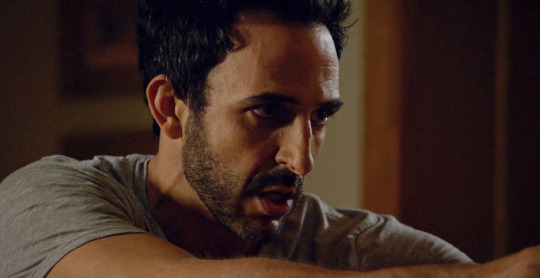
Aram’s got muscles.
Samar has Elise call and make that final verification of ‘all clear’ to Odette at gunpoint.
Liz is concerned that Elise might have coded her words in some way that would alert Odette. Red suspects she’s really worried about Kirk.
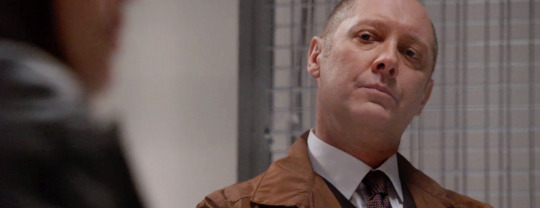
Red: I don’t believe Elizabeth’s concern is about her security or her daughter’s.
Liz: That is my only concern.’

“Clearly your only concern is that it might actually bother me that I’m about to entrap my biological father, that because of me, he’s gonna go to prison for the rest of his life.”
Kirk committed actual crimes that will be more the reason he’ll go to prison for the rest of his life, but Liz is turning him in. So.
"If I go through with this, you will be my only link to my past. I lost Sam. I lost my mother. And I’ll lose Kirk.”
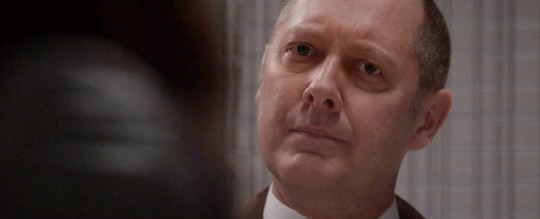
“And whatever you want to call him, he was married to my mother. He raised me as a child. And he’s willing to do what you are not… Tell me about who I am.”

Tom shows up with a scribbled down message from the phone. The meeting is set.
So the FBI will be at this meeting place to deal with Kirk’s men. Meanwhile, Red and Liz will arrange to have Kirk go to a different meeting place. Because Red wants to deal with Kirk himself. He puts it down as a condition of his continuing his work with the task force.
Liz calls Kirk to arrange that alternate location.
Liz: The FBI knows about your mole. They’ve got her in custody....They know about our meeting…I’m telling you, it’s a trap.

Kirk: ...Doesn’t matter. I have an alternate location.
Odette is like, ‘wtf are you doing?!’ Kirk waves her off. He’s fully convinced Masha is on his side now.
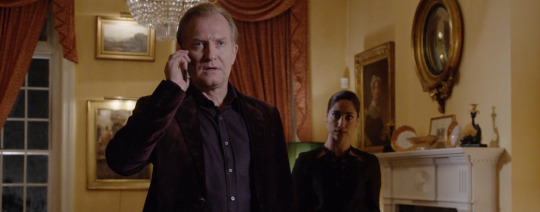
Shoulda listened to his weird girlfriend.
I remember kind of wanting Liz to be doing this for real.
Liz meets Kirk on the roof while we’re led to believe Red is headed for the tunnels, when he’s also on his way to the roof.
She steps out and asks where Agnes is. Kirk says he’ll bring her out once Reddington has been ‘dealt with.’
Liz: What are you talking about?
Kirk: Smile, solnishko. In less than 5 minutes, he will be dead...

Liz: That wasn’t our agreement.
Kirk: No. But you know as well as I do, it needs to be done.
Liz: I picked you… over him. I lied to everyone for you. Now you want to kill him? You can’t do that.
Kirk: I’m doing this for us.

Liz: I know you’re sick. I know that Agnes and I are nothing more than possible donors for you.
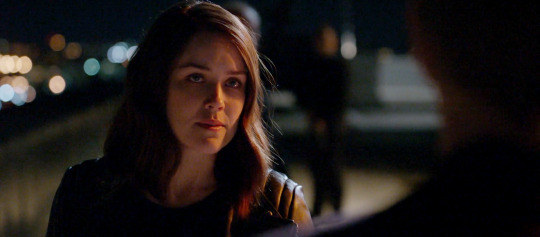
Kirk: Oh, come now. You know if that were true, all of this would have been resolved long ago with your abduction. True… it’s a consideration. But the only circumstances under which I’ll accept your help… is if it’s given freely.

"We had a deal.”
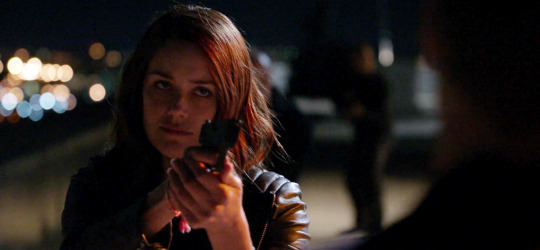
"Patience, dove.”
He waves Romina over. But before he can hand Agnes to Liz, Red bursts through the door and Kirk runs.
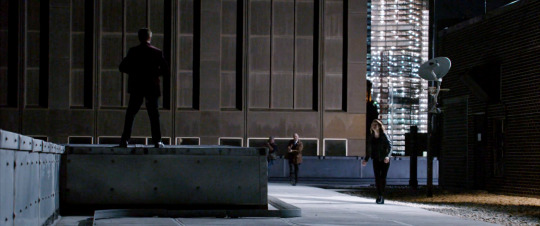
I.. have a hard time analyzing this ledge scene cuz I just find it kinda stupid. I’m sorry, I’ve tried not to, and I just... I can’t even like... nope.
I think it’s supposed to showcase just how desperate Kirk has become. To show Red. But I never get a real sense he’s actually gonna do it?
Also, Kirk has clearly kinda lost it on this whole thing, but still. Protect the kid by killing her? I mean, even in your most desperate straits, would that be the conclusion you’d come to? Maybe. I doubt it.
If Red having her is the issue, Red could just back away and say, ‘okay okay, i’ll leave her alone. look, walking away. just get off the freaking ledge.’
Also, Kirk could totally have just killed Red right there. So all around I’m just like... this dumb.
Liz embodies fear.

“This is madness, Constantin. Because you cannot have that child, you’re gonna take her forever from her mother? It’s madness.”

It’s actually not about him not having the child, it’s about you not having the child. But whatevs.
This has to sound incredibly odd to Constantin, who thinks Reddington did exactly that. Well, kinda. He thinks Reddington took a kid that wasn’t even his just ‘cuz he was mad at Kat for breaking off the affair. That’s probably what he was told about it. Kat’s deception feeds this whole thing.
It’s unclear what Constantin knew between the kidnapping and the suicide. Perhaps he believed Kat was so devastated she killed herself, idk. So Reddington took his child and killed his wife, basically. In Kirk’s mind.
Kirk shoots at Red and wings him.
Liz asks him in Russian not to do this.
“There is no other way, solnishko. This man, that took your mother away from us, took you from me, he will not have my granddaughter.”
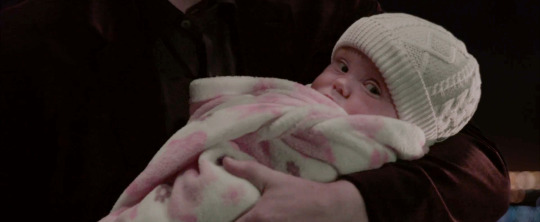
“And I hate him as much as you do for it. But if you love me, if you ever loved me...”

“Just give her to me. Please. Otets. Please, father.”

When she finally gets Agnes, she exhales in sharp relief.
Red’s eyes are on Kirk.
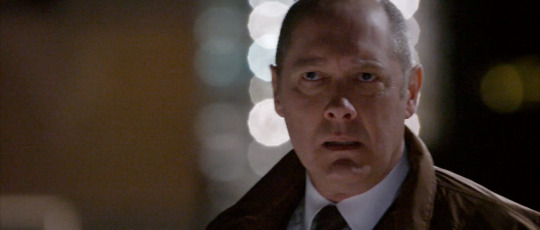
Liz has her pink burrito.

We cut from this to Aram and Samar watching Janet get interrogated.
Aram: I was an idiot.
Samar: No. You were human. You wanted something, and she was trained to exploit that.
Aram: Trained, or born?
Samar says she’s no longer transferring. Little montage of the two of them eating the leftovers of Aram’s perfect date with Tom and Liz looking at Agnes, Kirk being put in the box, and the Hunter feeding Kaplan.
Red shows up to see the baby.
"I just wanted to thank you for trusting me, trusting the plan. I understand what a.... a leap of faith it must have been.”

"Not really. Considering what was at stake.”

Red asks if he can come in. He sees Agnes.
“She’s a beautiful girl.”
When I first watched this, I got serious ‘Liz and Tom are gonna jump him now’ vibes. Cuz Kirk was only one of the two criminal bosses in their lives. You’d think, one down, one to go. But then Liz is just like, ‘yeah, we’re not going to live under your guard anymore.’ They’ve clearly discussed this beforehand.

Red knows. He knows she’s felt suffocated. He’ll be eager not to make her feel that way again.

He bids them good night and leaves.
The door slams on Kirk’s box.

Told ya. You should always listen to your weird girlfriend.
7 notes
·
View notes
Text
Fighting Local Government Corruption - Part 6 of ?
Why do some people feel that they can trample other people's rights and that's fine? This article will be fast and heavy. We are going to see the eight ways that people detach morality from their actions, why it's hard to tell when politicians are lying, a disturbing statistic related to the dark triad, two experiments that show the tendency of some people to abuse power and other people to follow bad orders, how stories reveal some of these processes, and the possibility for redemption.
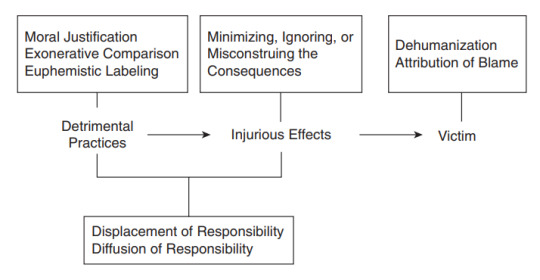
There are eight techniques that people use to make the bad things that they do seem okay. The psychologist Albert Bandura wrote the book "Moral Disengagement". He also has a five page paper by the same name. By knowing about these you can be more alert and aware of the various manipulation techniques that are used. This will be a short overview. They have semi-confusing names, so I'll break down what they really mean.
Moral Justification
This is simply doing bad things as a means to a "good" end. "I'll sacrifice those people over there so that I can get to this thing I want." Those other people are just collateral damage. It's all for the greater good anyway. This basic view is that humans aren't really ends in themselves, they are just tools or obstacles. (It's disturbing, I know, but it will get worse. Still, it's important to know these things.)
Euphemistic Labeling
This is how politicians talk. It's why it's often confusing and boring to listen to them. If, for instance, they were to tell the truth they wouldn't say, "I lied." Nope, they will say something like, "I presented the information through a medium in which I believed we would be able to protect the lives of innocent children." What does that have to do with it? We'll all wonder what they're talking about, because they aren't really talking about anything. It's often worse than that too. Sometimes they do something like this, "Things that were untrue were communicated." It means the same thing as "I lied.", it just sounds like they didn't do anything wrong, and that's why they use it.
Exonerative Comparison; or, Advantageous Comparison
"Maybe I've done bad things, but look at that guy over there, he does even worse things. So, maybe I'm not really that bad."
Displacement of Responsibility
"Someone else told me to do this bad thing, so it's not really my fault."
Diffusion of Responsibility
"I wasn't alone in doing this, a bunch of other people were part of it too, so you can't really blame me."
Minimizing, Ignoring, or Misconstruing the Consequences; or Disregarding or Misrepresenting Injurious Consequences
There are a lot of examples that fall into this category, but here's one simple example: "It's not really hurting them that bad."
Dehumanization
This is where you think of other humans as not human. It's often used in atrocities of various sorts, like when the Nazis called Jews pests. "These people are lower than us, they don't have rights because they don't deserve rights." (I think this is the most disturbing.)
Attribution of Blame
This one seems odd at first, but it's common. They just blame the victim for what they're doing to them. "You brought this on yourself."
Obviously some of these techniques are also why it's hard to tell when politicians are lying, but there is specific research into this too. Here is a tiny look into that. This is a piece of the abstract from the paper "Manipulating Public Opinion with Moral Justification" by Kathleen McGraw.
- - - - - - -
...why it is so difficult to detect deceptive moral justifications. The difficulty arises because (1) people are not very good at detecting deception in general; (2) the mediated nature of political communication eliminates the nonverbal cues that are the most predictive of deception; (3) social judgment biases lead people to focus on the individual and inhibit suspicion; (4) the norms of political culture constrain politicians from accusing each other of lying, so that the public is not prompted by other sources to regard moral claims with suspicion.
- - - - - - -
Luckily, not everyone is so constrained. For instance, let me reveal some information for you.
- - - - - - -
This is from the Muskegon Circuit Court's website showing the township suing Hidden Creek Farm.
https://drive.google.com/open?id=1ynL4G4o3kY1ZCX8UB3nKQoWt1JFt8JWQ
Here's the township supervisor lying about it.
https://drive.google.com/open?id=1X9TVcNZIubvTI49iR7ZOnxtuWuzo0kQM
Here's a recording of the township lying about it. (It's a phone call just over 6 minutes long. You'll have to download it to listen to it.)
https://drive.google.com/open?id=1YDg8L1yU6xfO99ggWTw-YcR3GePglc9O
Here's a trustee saying he wasn't informed.
https://drive.google.com/open?id=1mcDn0hBEHCiPpl3VTui_Z3GsOgT9bcwN
Here are the minutes before the lawsuit and injunction showing that it wasn't discussed in an open meeting.
https://drive.google.com/open?id=11ou0UvSKl8Ddpd0tkv3ECCWSo4B8hb78
Here are the minutes after the lawsuit and injunction. The lawsuit still isn't discussed, and the injunction is voted on after it was already done.
https://drive.google.com/open?id=1BpP4jVZ34d0VErSIEGFzjRLFs3mWkFMA
- - - - - - -
Next, there truly are dark individuals. Most reasonable people know this, but they never expect to interact with them. They think they only exist on the news or in drama shows.
The dark triad is a set of three dangerous traits: narcissism, Machiavellianism, and psychopathy. Narcissism means the person lacks empathy and has an overly grandiose view of themselves. Machiavellianism means the person manipulates and exploits people, doesn't worry about morality, and uses deception to get their way. Psychopathy means the person can be remorselessly antisocial.
There are people out there with these traits. Here's the scary statistic: one percent of people are psychopaths. That means that out of the next 100 people you see... yeah. Add sociopaths into the mix and you at least double that number. Think about that when you're at a large gathering of people, look around, think about it, it's scary.
The environment makes a strong difference as well. The controversial Stanford Prison Experiment was funded by the Navy to see how and why abuse comes about in prisons. Students were randomly assigned to be guards or prisoners. With small suggestions to do what was necessary to keep the "prisoners" in line, the "guards" quickly turned to classic methods of prisoner abuse. Power and authority given to the wrong people in the wrong situation results in bad things.
Not always is it even the people with the most authority that do the actual deeds, sometimes they are just ordered to. Stanley Milgram did experiments to see if it might be true that the people that committed atrocities in the Holocaust felt like they were truly "just following orders." As it turns out, most people are willing to give massive electric shocks to people if they are told to do so by an authority figure. They are uncomfortable doing it, but they still do it. People question it, they feel like it's wrong, but when reassured and told to continue, they do. In the struggle between obedience and conscience, the conscience usually loses.
Some narratives do a good job of exploring these processes. For instance, in the television show "Poldark" Elizabeth makes small compromises. Slowly, over years of moral compromises, she puts herself in a position where she has to do bad things to try to justify the previous compromises she has made. Her bad decisions and bad deeds grow over the years until they become destructively large. It was bad at the beginning, but because it was small she got away with it, she thought.
Another way it can happen is like Danny from "Game of Thrones". At first she is doing bad things to bad people, and it's justified. But, over time she keeps doing those bad things, even when she is crushing innocent people.
This all brings us to the possibility for redemption. I believe that there is always some possibility for redemption in life, even Scrooge in "A Christmas Carol". But, if there is a jewel thief that is seeking for redemption, he still shouldn't be left alone in a jewelry store at night with a key. It's the same with positions of authority. When moral and legal violations have been made I believe there should be attempts to restore justice by the individuals that committed those wrongs. That process is best completed as a personal journey, after those people are removed from their positions of authority, by themselves or by the citizens.
Many of the things mentioned in this article are unsavory to look at, to listen to, to think about, but if we forgo our responsibility of being aware, then who will stop them?
________________________________________________
You can find more of what I'm doing at http://www.JeffreyAlexanderMartin.com
0 notes